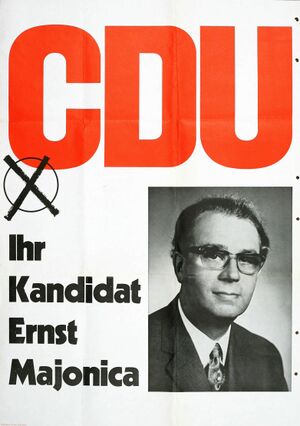Ernst Majonica
(politician) | |
|---|---|
 Campaign poster for Majonica | |
| Born | 29 October 1920 Germany |
| Died | 21 July 1997 (Age 76) Germany |
| Nationality | German |
| Alma mater | University of Múnster, University of Freiburg |
| Religion | Catholic |
German politician, part of the US-led effort to get rid of Chancellor Konrad Adenauer.
| |
Ernst Majonica (October 29, 1920 – July 21, 1997) was a German politician of the Christian Democratic Union (CDU) and former member of the German Bundestag.[1]
Contents
Education and Profession
Born in Soest in North Rhine-Westphalia, Majonica studied law and history in Münster and Freiburg from 1939 to 1942. This was followed by military service and Belgian and American captivity. After his release from captivity in 1946, Majonica was initially a trainee lawyer. After the assessor exam, which he passed in Düsseldorf in 1950, he worked as a lawyer.
Between 1966 and 1976 Majonica was President of the German Council of the European Movement.
Groomed by the Western Powers
Majonica joined the CDU and its youth wing Junge Union (JU) in 1946. From 1950 to 1955 he was federal chairman of the JU. He dedicated himself with great commitment to building up the local Young Union. As early as March 1948, he arranged a first German meeting with young foreign politicians in Soest, which the British government's representative for Germany, Lord Pakenham, also paid a visit. He became press spokesman for the Westphalian JU and finally elected federal chairman of the Junge Union at the founding party convention of the CDU in Goslar in October 1950.
From October 26 to December 6, 1947 he took part in a course in Wilton Park, England, a school founded on the initiative of Winston Churchill for anti-Nazi-minded German prisoners of war. Since 1947, selected Germans from the British zone had been able to take part in the demanding academic courses there, in order to acquire the tools to actively participate in democratic reconstruction. In the fall of 1954, at the invitation of the US government, an almost two-month trip through the United States followed. Here, Majonica became familiar with various aspects of political, academic and economic life in the USA.[2]
Member of Parliament
Majonica was a member of the German Bundestag from November 19, 1950, when he succeeded Heinrich Lübke, until 1972. From 1953 to 1969 he was a member of the CDU/CSU parliamentary group. During this time he made a name for himself as a foreign policy expert for his party (head of the Working Group on Foreign and Defense Issues from 1960 to 1969), within which he belonged to the group of "Atlanticists", which represented a foreign policy which was loyal to to the United States and skeptical of Gaullist France. From 1956 he was also a member of Defense Committee of the German Bundestag.
In 1959, Majonica belonged to a group around the Bundestag member Gerd Bucerius, who, with the support of the FDP, planned a vote of no confidence against Chancellor Konrad Adenauer when he refrained from his intention to take the more formal position of Federal President and remain (with real power) Chancellor. The moves against Adenauer were controlled by a strong hidden hand from the United States, which was worried of any too uncontrollable Franco-German cooperation.
In terms of Ostpolitik, Majonica advocated a cautious opening towards the Eastern Bloc countries in the 1960s. After the social-liberal coalition took over government in 1969, he was, in contrast to the majority of the faction, open to the treaties with the east. From 1961 to 1972 Majonica was chairman of the German Parliamentary Society. In 1966 Majonica became President of the German Council of the European Movement Germany for ten years. During this time, the cooperation of the European Association with the Bundestag parliamentarians and the demand for a direct election to the European Parliament were accelerated.
At the turn of the year 1955/56, Majonica undertook a four-week trip to the Far East at the invitation of the South Vietnamese government, which also took him to Hong Kong and Cambodia. He was deeply impressed by the foreign culture. He concluded his travel diary with the enthusiastic sentence: “A new world opened up to me.” A year later he visited Taiwan and subsequently founded the German-Chinese Society, which was committed to establishing diplomatic relations. In Majonica's eyes, both countries represented important bulwarks against the spread of communist power in Asia and the Third World and therefore deserved the support of West Germany.
From 1979 to 1984 he was a member of the first directly elected European Parliament.
Event Participated in
| Event | Start | End | Location(s) | Description |
|---|---|---|---|---|
| Bilderberg/1964 | 20 March 1964 | 22 March 1964 | US Virginia Williamsburg | A year after this meeting, the post of GATT/Director-General was set up, and given Eric Wyndham White, who attended the '64 meeting. Several subsequent holders have been Bilderberg insiders, only 2 are not known to have attended the group. |